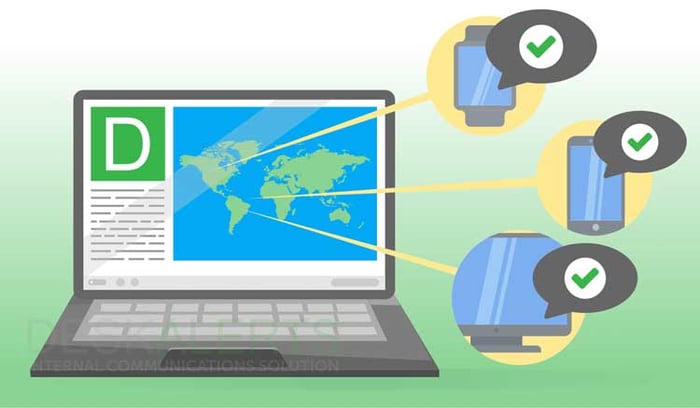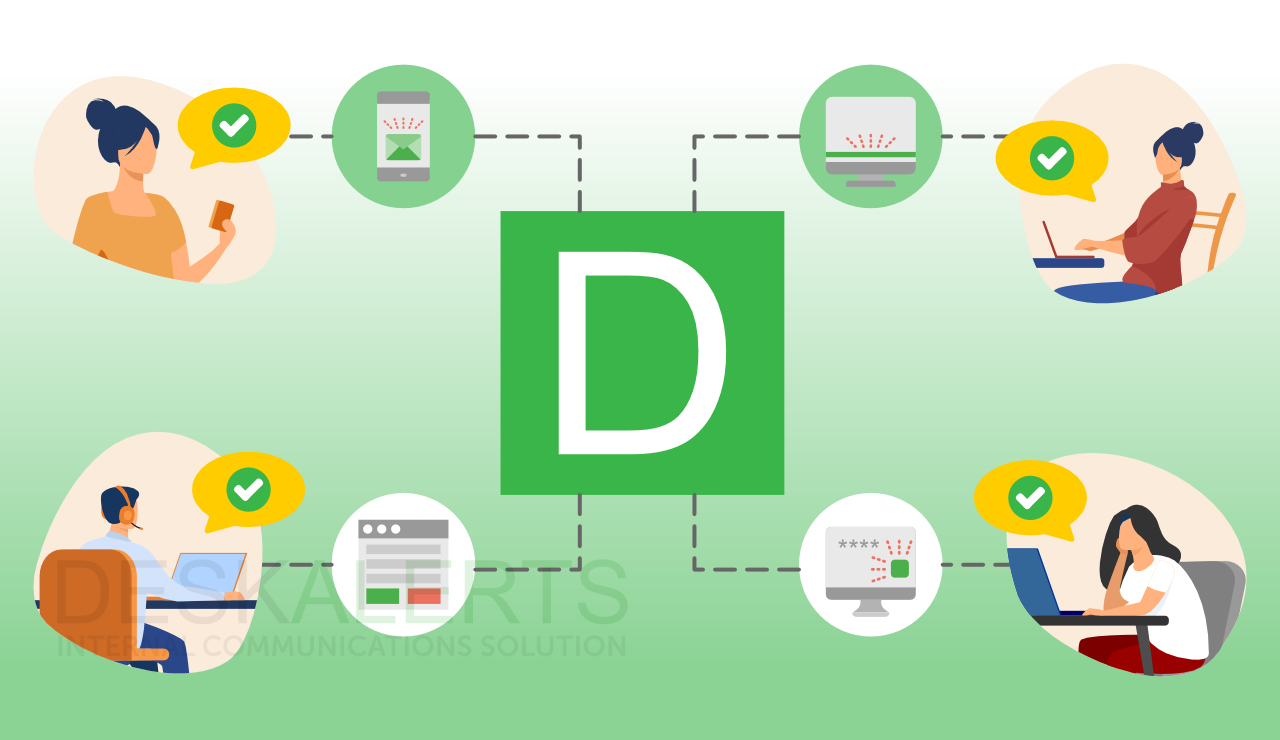
Email is still among the most widely used communication tools in the workplace today. However, while email is still the go-to medium for a lot of people, companies find that there are pros and cons of email for communications if they don’t take steps to ensure that it is being used efficiently and effectively, and alongside other internal communications tools.
Table of Contents
The importance of email communication in the workplace
The role of email in business communication
Email disadvantages and advantages in workplace communications
Best practices for effective email communication
Improving email communication in an organization
THE IMPORTANCE OF EMAIL COMMUNICATION IN THE WORKPLACE
There are email disadvantages and advantages; however, effective email communication in the workplace is crucial for a streamlined information exchange, fostering productivity and collaboration. It offers a swift and documented means of conveying messages in a way that enables employees to communicate efficiently across departments and geographical locations. Email's importance lies in its ability to transcend time zones, providing a platform for communication that accommodates diverse work schedules.
Email is important for project management, allowing teams to share updates, discuss strategies, and coordinate tasks seamlessly. It serves as a formal record, enhancing accountability and providing a reference point for decisions and agreements.
Ensuring professionalism and clarity in email communication is vital. Clear subject lines, concise language, and proper formatting contribute to effective email communication in the workplace, reducing the risk of misinterpretation.
THE ROLE OF EMAIL IN BUSINESS COMMUNICATION
There are many important roles played by email communication in business:
- Email in business communication provides a rapid and efficient means of exchanging information.
- It serves as a written record of business transactions, decisions, and interactions, providing a valuable archive for reference and accountability.
- Email facilitates communication on a global scale, connecting businesses, clients, and partners across geographical boundaries. This global reach is crucial for international trade, collaboration, and networking.
- Email in business communication is a formal and standardized mode of communicating official announcements, project updates, and other business-related correspondence.
- The ability to attach files and documents to emails streamlines the sharing of critical information, including reports, contracts, and presentations.
- Businesses use email to communicate with clients, providing updates, addressing inquiries, and maintaining ongoing relationships. It serves as a professional channel for client interactions.
- Organizations use email for official notifications, policy updates, and disseminating important information to employees in a timely manner.
- Email in business communication leads to feedback loops, decision-making processes, and collaborative discussions, contributing to the overall functioning and efficiency of business operations.

EMAIL DISADVANTAGES AND ADVANTAGES IN WORKPLACE COMMUNICATIONS
Like most internal communications tools, there are advantages and disadvantages of emails in the workplace:
Advantages of email for internal communications
- Email is a free tool. Once you are online, there is no further expense that you need to spend in order to send and receive messages.
- Email is quick. Once you have finished composing a message, sending it is as simple as clicking a button. Email, especially if an email system is integrated into the network, is sent, delivered, and read almost immediately.
- Email is simple. It is easy to use. Once your account is set up, composing, sending, and receiving messages is simple. Also, email allows for easy and quick access to information and contacts.
- Email allows for easy referencing. Messages that have been sent and received can be stored and searched through safely and easily. One of the email advantages is that it is a lot easier to go through old email messages rather than old notes written on paper.
- Email is accessible from anywhere – as long as you have an internet connection. Whether or not you are in the office, in the field, or even overseas, you can access your inbox and go through your messages.
- Another of the main email advantages is that it is paperless and therefore, beneficial for the planet. Not only can you reduce the costs of paper, but you are also reducing the damage paper usage does to the environment.
- Email allows for the mass sending of messages. An effective medium to utilize to get your message out there, you can send one particular message to several recipients all at once.
- Email allows for instant access to information and files. You can opt to send yourself files and keep messages so that you have a paper trail of conversations and interactions you have online, just in case you may need them in the future.
On the other hand, while internal email certainly has its advantages, it can also have disadvantages, especially if an email alert system is not available in the workplace.

Disadvantages of email for internal communications
- Email could potentially cause information overload. Some messages may be dismissed or left unread, especially if there are a lot coming in and the network has not integrated some sort of email alert system into the computers at work.
- Email lacks a personal touch. While some things are better off sent as written and typed messages, some things should be verbally relayed or written by hand in a note or letter.
- Email can be disruptive. Going through each email can be disruptive to work as it does require a bit of time. This disruption is decreased through the utilization of an email alert system.
- Email cannot be ignored for a long time. The thing with email is that it needs constant maintenance. If you ignore it, more and more messages will enter your inbox until it gets to the point that your inbox is no longer manageable.
- Email can cause misunderstandings. Because email does not include nonverbal communication, recipients may misinterpret the sender’s message. This is particularly true of senders fail to go through their messages before they send them.
- Email messages can contain viruses. It’s best to be aware of this possibility so that you are careful when opening messages from people you don’t know, or when downloading attachments.
- Emails should be kept short and brief. This is especially difficult if you are one to send messages that are too long.
- Email requires timely responses. While some people tend to disregard messages, those that require responses should be replied to as soon as they are received and read. If not, urgent and important messages may be left untended.
Best Practices for Effective Email Communication
Effective email communication is crucial for professional and personal interactions. Here are some best practices to ensure your emails are clear, concise, and effective:
1. Use a Clear Subject Line
Make it specific and relevant to the content of the email. This helps the recipient understand the purpose of the email at a glance.
2. Start with a Professional Greeting
Address the recipient by their name if possible. Use appropriate titles and formalities depending on the relationship and context (e.g., "Dear Dr. Smith" vs. "Hi Alex").
3. Be Clear and Concise
Get to the point quickly. Avoid unnecessary details and lengthy explanations. Aim for clarity and brevity.
4. Use a Professional Tone
Maintain a respectful and courteous tone. Avoid using slang or overly casual language, especially in formal or professional contexts.
5. Be Mindful of Formatting
Use standard fonts and sizes. Avoid excessive use of bold, italics, or colors. Proper formatting helps readability.
6. Proofread Before Sending
Check for spelling, grammar, and punctuation errors. Ensure that names, dates, and details are correct.
7. Include a Clear Call to Action
If you need a response or action from the recipient, state it clearly. Be specific about what you need and any deadlines.
8. Attach Relevant Files Appropriately
Ensure attachments are necessary and relevant. Mention them in the body of the email and make sure they are in a commonly accessible format.
9. Use a Professional Signature
Include your full name, position, company (if applicable), and contact information. This provides recipients with additional context about who you are and how to reach you.
10. Use Out-of-Office Replies Wisely
Set up an out-of-office reply if you're not available, providing alternative contact information or a return date.
By adhering to these best practices, you'll enhance the effectiveness of your email communication and foster better professional relationships.
IMPROVING EMAIL COMMUNICATION IN AN ORGANIZATION
Love it or hate it, email communication in the workplace is probably here to stay for a long time to come. It doesn’t have to be the bane of corporate life if you take steps to make it work more effectively for your organization, recognizing the advantages and disadvantages of email in the workplace and including it alongside other internal communications tools and channels. Actively improving email communication will make it a much more valuable internal communications tool.
Effective email communication in the workplace is achievable if you set clear guidelines for employees about appropriate email use, and have an understanding of email pros and cons.
This includes:
- Minimizing the use of email when there is an email substitute that is a more effective option, such as having a face-to-face conversation with a colleague, using instant messenger, sharing ideas on a project platform, etc.
- Employees should be discouraged from hitting “reply all” or responding with unnecessary one-word emails like “ok” or “thanks”.
- Emails should only be sent to relevant employees.
- Restricting access to those who are able to send emails to the entire organization.
- Encouraging employees to adopt “inbox zero” or similar programs to cut down on their emails.
- Using clear subject lines that people can look at and instantly know what the topic of the email is going to be about.
- Email communication should be clear, concise, and easy to understand.
- Insisting on a standard of professionally written, proofread emails.
- Encourage employees to delete unnecessary emails and to set up good archival systems to hold on to important emails they may need in the future.
When you weigh up the disadvantages and advantages of email in the workplace, you’ll soon realize it is an important communications tool - but one that should be used sparingly, and alongside other communications channels.
For urgent communications and in situations where it is critical that you have to ensure everyone sees the message you are sending, you can overcome the advantages of email in the workplace communication by using an alerting system, such as DeskAlerts, to bypass email and send messages straight to computers.
FAQ
WHAT ARE THE ADVANTAGES OF EMAIL COMMUNICATION?
What is the primary business advantage of using email? Email offers a fast, efficient, and convenient way to communicate with others, allowing messages to be sent and received instantly from anywhere in the world with an internet connection. Other benefits of email are that it provides a written record of communication that can be easily referenced and searched, helping to avoid misunderstandings and disputes.
WHAT ARE THE DISADVANTAGES OF EMAIL COMMUNICATION?
There are several pros and cons of email. The disadvantages of using email for internal communications
- Email could potentially cause information overload
- Email lacks a personal touch
- Email can be disruptive
- Email cannot be ignored for a long time
- Email can cause misunderstandings
- Email messages can contain viruses
WHAT ARE THE ADVANTAGES OF USING EMAIL FOR BUSINESS COMMUNICATION?
Email is a powerful tool for business communication with many advantages. Firstly, it offers a fast and efficient means of communication, allowing messages to be sent and received in real-time from anywhere in the world. This is particularly important in today's globalized and interconnected business world. Email also provides a written record of communication, which can be easily accessed and referred to, helping to avoid misunderstandings and disputes. And by allowing for the attachment of files, images, and other digital media, email is a versatile tool for sharing information and collaborating with others.
HOW HAS EMAIL CHANGED THE WAY WE COMMUNICATE?
Email has fundamentally changed the way we communicate, transforming the speed and reach of our interactions. In the past, communication was limited by time and distance, but with email, messages can be sent and received instantly from anywhere in the world.
This has revolutionized business communication, making it easier to collaborate and share information across borders and time zones. Effective email communication has also transformed personal communication, allowing people to stay in touch with friends and family across long distances, while also providing a platform for sharing news, ideas, and opinions on a global scale.
The ability to send and receive emails 24/7 has become both an advantage and disadvantage of email. We’ve never been more connected to our workplaces and the world than we have been before. However the down side to this is that people can become overburdened and overworked, unable to disconnect and “switch off” from work.
WHY IS EMAIL NOT THE BEST COMMUNICATION?
While email has many advantages, it also has some drawbacks that make it less than ideal for certain types of communication. Email lacks the nonverbal cues that we use to convey tone and emotion in face-to-face conversation, leading to misinterpretation and misunderstandings. The constant influx of emails can be overwhelming and distracting, leading to information overload and decreased productivity. Other problems with email communication in the workplace are that it can be less personal and less effective than other forms of communication, such as phone calls or face-to-face meetings, particularly when dealing with sensitive or complex issues that require more nuanced communication.
What are the advantages and disadvantages of using email in the workplace?
There are several disadvantages and advantages of email use in the workplace. Advantages of using email include efficient communication, document sharing, and global reach. However, disadvantages include information overload, misinterpretation, and the potential for security breaches. Additionally, reliance on email may hinder face-to-face communication and lead to delayed responses, impacting real-time collaboration.
Why is email communication important in the workplace?
Email communication in the workplace is crucial for efficient and formal correspondence. It enables quick information exchange, documentation, and facilitates remote collaboration. Email in business provides a written record, aiding in clarity, accountability, and reference for future communication and decision-making.
Which of the following is an advantage of email communication?
An advantage of email as a communication tool is its efficiency in facilitating a fast exchange of information in a way that lets people communicate and share data across distances and time zones.
How has email affected the workplace?
Email has transformed the workplace by enabling rapid communication, document sharing, and global collaboration. Email business communications have enhanced efficiencies but have also introduced challenges like information overload. The shift to digital communication has altered traditional office dynamics, affecting interpersonal interactions and work processes.
How does the use of email benefit business communications?
The use of email in business communication provides a fast and transparent information exchange, leading to better decision-making and collaboration. Business communication email also supports the dissemination of official documents and announcements with a traceable record for accountability and reference.
Achieve Better Communication Across Your Organization. Discover how DeskAlerts can help you deliver urgent messages instantly and bypass email clutter.











